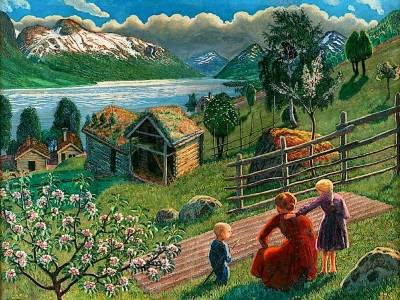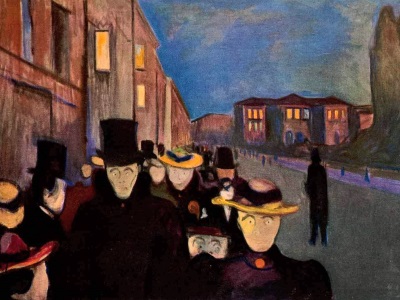Jesus repeatedly challenges us to work while it is still day. He compares his kingdom to labor in a vineyard, to the careful investment of entrusted money, to the good use of one’s talents. If God’s kingdom is to transform our vale of tears into a realm of joy, then God’s kingdom must be a kingdom of work. Work alone befits the destiny of the human spirit.
Our very nature calls us to a life of productive labor. We will find joy in life only by joining in the untainted fellowship of work. Those ruled by the spirit of mammon hold that people take no pleasure in work without profit. But that is a lie; in reality, what makes a person truly happy is that person's deep vocation to work – the urge to get a job done, to do something worthwhile, to give practical help. True happiness is found not in making money, but in the productive and successful use of our strength – though we must each find that activity which suits us best, which corresponds to our particular gifts, interests, and inclinations.
It is commonly argued that this is utopia – that no one would perform menial tasks unless compelled to do so. But such reasoning arises only out of the debased morality of our modern-day humanity. Most people today are unable to find any joy in simple or lowly tasks. Yet at the same time, they affirm quickly that the difference between so-called respectable and degrading work disappears when they are caring for a loved one. Love ignores these distinctions; whatever we do for the beloved person seems good to us.
That so many people value the work of the mind over physical labor shows the unhealthy state of our society. Humanity is simply not meant to concern itself continually or exclusively with lofty ideals and spiritual matters. Those who seek only intellectual sophistication will one day pay a bitter penalty: a rude awakening to life’s ugly realities. True, a person’s intellectual life needs to be stimulated and deepened if that person is to become human. But only when people know the pleasures of physical labor will they experience the joy of being – joy in God and joy in his creation.
A person who feels estranged from nature is sick. Healthy people long to exercise their bodies, to do simple farm work, to be in the sun and the light; to make friends with woods and mountains, to touch plants and animals, to feel the soil. These longings may have receded before the pressures of our big cities with their hypercivilization, but in the end they will break through all the more forcefully.
Tolstoy’s Russian peasants may thus surprise us with their primitive bliss, which seems to depend on the possession of a sound body and the ability to work with healthy hands. But this spirit of loving dedication bestows on their experience of nature a profound consciousness of fellowship, through which the simplest physical activity becomes a source of bounteous joy. Such joy cannot even be imagined by the depraved hedonists of our sham civilization.
People will never stop longing for a life of simple fellowship in nature. To take pleasure in nature, to work with nature – as well as to deepen the intellectual life, and to be creative in works of love – these things are the immediate objects of our longing. It is not in keeping with God’s will that these ends should be opposed or disparaged. In fact, we cannot even attain these things on our own. They can be given to us only by God.
Adapted from Johann Christoph Arnold, ed. Eberhard Arnold, Modern Spiritual Masters (Rifton, NY: Plough, 2011). The original 1919 text, “Jesus and the Future State,” can be read in our digital archive.
Article edited for length and clarity.


